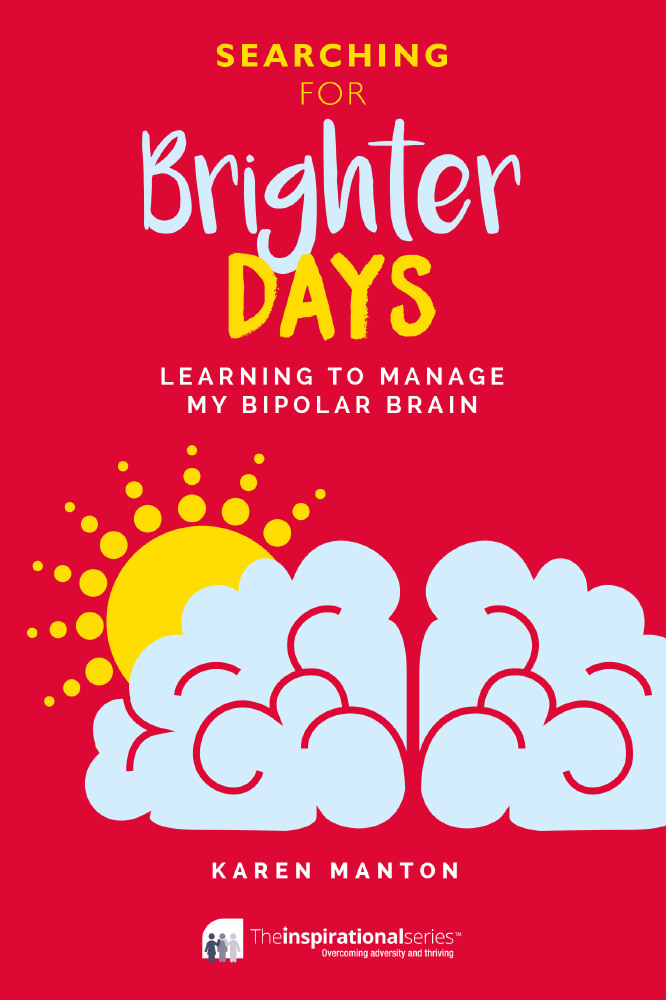Written by Karen Manton, author of Searching for Brighter Days: Learning to Manage my Bipolar Brain, Trigger Press

Karen Manton
For some reason bipolar disorder has been somewhat glamorised over the years, particularly in film or media. But the stark reality is that for many people, including me, bipolar disorder can often feel like a curse. I can safely say that, as a person who has suffered with this illness for over 31 years. Below are some reasons why I feel this way.
This is a list of ten consequences of bipolar disorder – of which many people are unaware.
A severe reaction to conflict – Many bipolar disorder sufferers struggle heavily with conflict. In fact, conflict can often be a major driver in a bipolar person’s relapse. In my personal experience, conflict can be very upsetting. I soak up negativity like a sponge, and this used to affect me quite badly in the workplace.
Sleep deprivation – At some time or another we all suffer insomnia or loss of sleep, but for someone with bipolar disorder it can be particularly hard to sleep. Loss of sleep can also actually be a trigger for manic or depressive episodes. It certainly was for me. My loss of sleep was usually caused by worrying, often if I’d been involved in conflict and was worried about losing someone’s friendship.
Difficulty adjusting to changes in daylight hours – My consultant made me aware that, at both times of the year when the clocks go back or forward, bipolar disorder sufferers are at greater risk of relapse. I suppose it makes a lot of sense because, as we try to adjust to earlier mornings, we might experience a lack of sleep. And then, of course, the dark, depressing winter days can have a big impact on our moods.
Oversensitivity – I am very aware of the slightest look that someone may give me or the smallest comment said in my direction. I can often pick up on these when no one else around me does, which demonstrates just how sensitive I am. Sometimes, as a result of this, I might jump to the wrong conclusion as my mind tries to guess the reason behind every statement or gesture.
Overthinking – As a bipolar disorder sufferer I am always deep in thought. There is never an occasion when I can just switch off and daydream. Something is always on my mind, and quite often that can cause me a lot of distress.
Insecurity – Throughout my life I’ve had an innate need to be loved and cannot bear to think that there might be people who do not like me. Of course, not everybody gets along, but to me it is important to be accepted. As a result, I can get very upset if anything happens that makes me feel unpopular or not liked.
Weight gain – Many people pile weight on from taking bipolar disorder medications and they can also make you very sleepy. However, we can learn to take control of this and offset our lower metabolisms with careful food planning and more exercise (if and where possible.) If your medication gives you such strong hunger pangs that it makes you want to eat all day, then discuss with your doctor the possibility of you taking them during the evening instead. That way, you can sleep through the hunger pangs.
Having to deal with misconception and misunderstanding – The extreme aspects of the illness often have a spotlight pointed onto them both in the public and private sphere, but this sometimes leads to misunderstandings and often a lack of knowledge on its true nature. This illness is not just about quick changes in mood, although many believe this.
Sometimes people assume that they may have bipolar disorder if they’re feeling particularly touchy or their mood changes quickly. But this illness is far more serious than that. And the likelihood is that if you did have it, you would not be the one to recognise it. A professional is always the best person to formerly diagnose you.
Severe highs and lows – There are different forms of bipolar disorder, but in my case bipolar disorder consists of severe highs and lows, both of which can last months at a time. The ‘highs’ often involve manic episodes – my manic episodes have included delusions, hallucinations, a raging sex drive and a compulsion to spend money. The ‘lows’ make me feel deeply depressed.
Being an exceptionally caring human being – Despite all of the negative sides of bipolar disorder, there are some positives. My life is still good – especially when I’m managing my condition well – and yours can be too.
I’ve found that bipolar disorder has made me a very caring person. I always want to help people and am attuned to the needs of others. I know what it is like to have suffered this illness and not have anyone really understand what I was going through. For that reason, I am happy to be there for others.

Searching for Brighter Days: Learning to Manage my Bipolar Brain, by Karen Manton, published by Trigger Press

